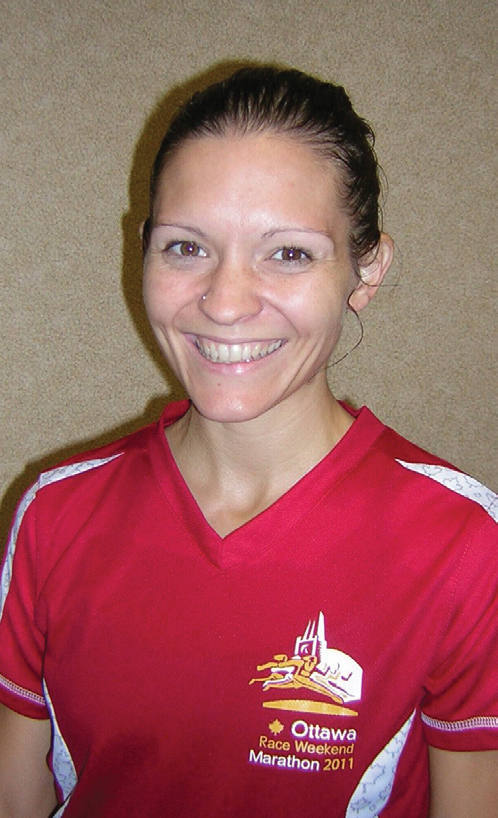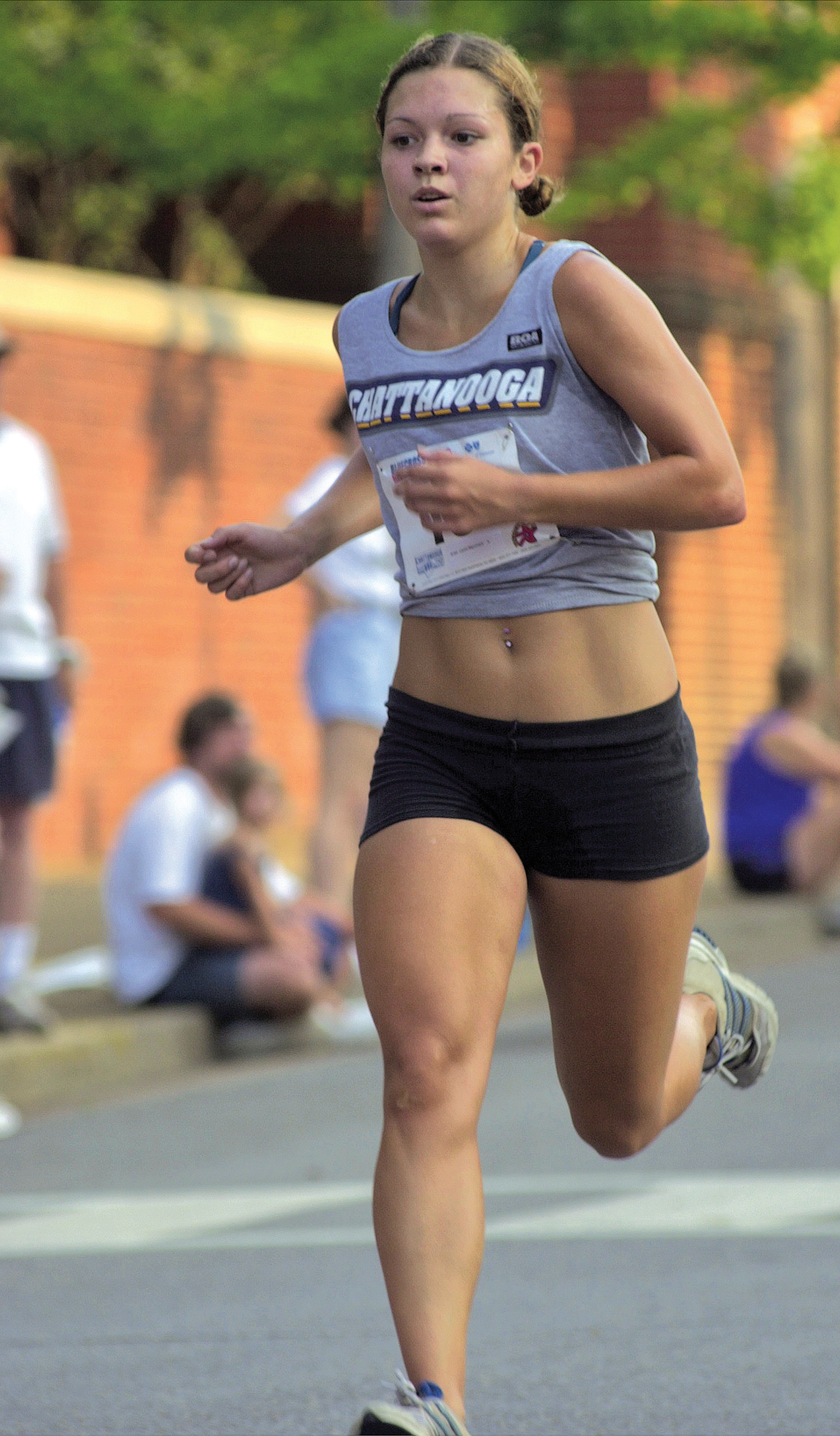In the months and years leading up to the 2012 London Olympic Games, athletes have fought to represent their respective nations. Some will be rewarded for their scrappiness and determination.
Lanni Marchant is scrappy, and she's determined. But she hasn't been awarded an athlete's highest honor. Instead, she'll likely be watching the 2012 Olympic marathon on TV, wondering what might have been.
Hitting Her Stride
To run in the Olympic marathon, the International Association of Athletics Federations requires women to have run 2:37:00 or faster. Canada sets a tougher standard, at 2:29:55.
Lanni Marchant, of London, Ontario, is faster than all but a handful of women in North America. Yet she's not fast enough.
Marchant, 28, is caught in the middle with a 2:31:50 personal best. She has progressed from a scholarship athlete at the University of Tennessee at Chattanooga to an international threat. While at UTC, she claimed multiple Southern Conference titles on the track (both indoors and outdoors), competed in the NCAA championships and was an Academic All-American.
She's also an attorney, with a dual law degree from the University of Ottawa and Michigan State University. She passed the Tennessee Bar Exam and began working in Chattanooga for Davis & Hoss, PC.
In the past 11 months, Marchant has run three marathons (starting with her first) and shaved 17 minutes from her time. Such a breakthrough doesn't come without sacrifice: In January, Marchant began a six-week block of high-altitude training in Iten, Kenya, where many of the world's best runners live and train.
On April 15, her new fitness was on full display as she ran 2:31:50 in the Rotterdam Marathon. She recorded the top Canadian female time of the year and became one of the 10 fastest Canadian females ever. Her raw time would have placed her 21st in the 2008 Olympics, and 8th in 2004.
What's more, her friend Krista DuChene finished just 10 seconds behind her. They're the two fastest Canadian women in a generation, and they have valuable momentum. But rules, traditions and two agonizingly long minutes will likely prohibit Marchant from toeing the line in London.
It's Not You, It's Me
Marchant isn't the only runner being overlooked. For the second straight Olympics, Canada simply won't field a women's marathon team. Now, Marchant is arguing against inequities in the standard versus the availability of talent.
"It's a blow to women's running, and it's a blow to our country," she says. "Two women ran the international standard the last time and didn't get to go," she says. "I think having a slightly more relaxed standard...we would've had more women going for it. There's no incentive for packs of girls to go after these times."
Meanwhile, Canada is trying to bolster its medal count with two athlete development programs. "Own the Podium" increases training resources for athletes they think can secure top finishes.
And "Rising Star" rewards athletes who have met the IAAF "B" standard with a berth based on their potential.
Pitch In
Show support for Lanni Marchant at facebook.com/letlannirun
Runners have traditionally moved up in distance and potential as they age. However, because of its separation from the track, "Rising Star" doesn't support the marathon. Marchant has proven that runners can develop into fast marathoners without spending years counting laps around an oval - but Athletics Canada is unwilling to suspend tradition.
"I'm (only) a 34-minute 10K runner," she says. "But I can run 35-minute 10Ks back to back. So I don't think their choice should be based upon how somebody can do in a 10K."
Marchant contrasts the Western world's normal urgency with Canada's reluctance: "It's almost a downfall. They're saying, 'Look what you accomplished by doing this in six months. Imagine if you decided to try for this three years from now!'"
She has momentum now, though. She's back from a fractured pelvis that sidelined her for nearly a year, and she's improving quicker than ever. "When I came back from that injury, I promised I wouldn't run anymore if it wasn't fun," Marchant says.
She returned to training, rejuvenated, with her eye on the marathon. Unfortunately, she was still susceptible to injury - even from something as "safe" as research. "Something was really wrong in my right hip," she says. "It turns out I was sitting so much that I pinched a nerve."
"I was so injury-prone that I had to make every run count," Marchant recalls. She emphasized quality, running about 60 miles per week. Eventually, she realized that to chase the standard, she would have to train like a true professional.
Kenya offered the jolt she needed. She ran more than 100 miles a week for the first time, while simultaneously learning "the art of the easy run." She stretched out on beanbags while she researched.
"There was nothing rushed about anything," Marchant says. "(But) I was still working full-time when I got back. My office did well to accommodate my training, but it wasn't easy."
For now, her legal career is on hold. "Nobody can ever take away what I've learned," she says. "And I'm not going to be 28 forever, you know?"
Re-Writing the Letter of the Law
Marchant has filed an appeal asking to compete in London, and it will surely be one of the strongest arguments ever to cross the desk of Martin Goulet, the Chief High Performance Officer at Athletics Canada.
"Precedent isn't 100-percent binding," Marchant insists. "Canada doesn't have to be bound by what they've done in the past, and this won't be a binding decision in the future."
"One thing I've learned with my legal training: The law is...open to interpretation. There are always underlying circumstances."
While preparing her argument, Marchant found hopeful news. "In Britain, they just named a guy to the team who didn't have the standard, but he had such an outstanding performance that they just let him on," she says.
"There's no point of having an appeals system if they're not going to take exceptions," Marchant says. "They set it up to allow people to challenge their decisions."
Marchant's youth is a double-edged sword. She has a thriving Facebook page that instructs supporters to email Athletics Canada. But in running years, 28 isn't particularly old. She can't argue that this is her last shot.
"As far as getting more support in the running community, it might have been a little better for me to be running and training in Canada," she says. "I'm still learning. That's just part of being young in the marathon world."
She expects a timely verdict. But regardless of Canada's decision, Marchant can be proud of what she's accomplished so far. "It's a great legal exercise, and it's getting my name out there," she says. "And it's getting attention for Canadian women's running."


